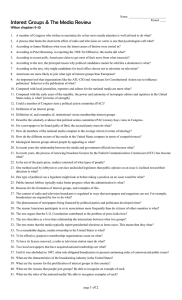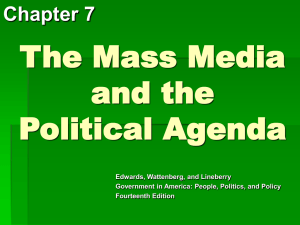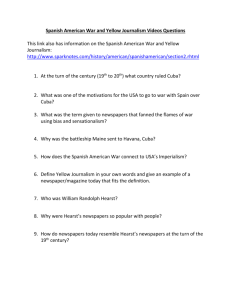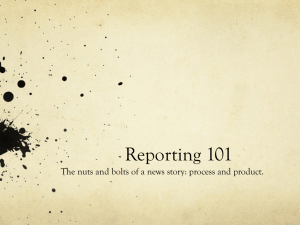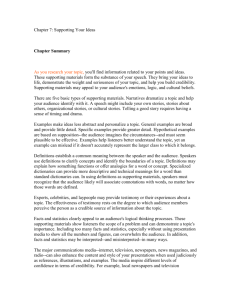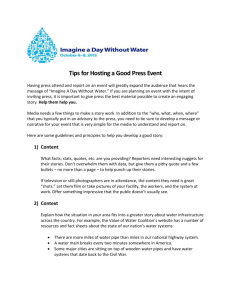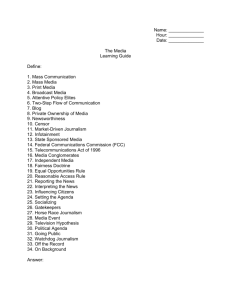Chapter 12: The Media Study Guide Advanced Government Mr
advertisement
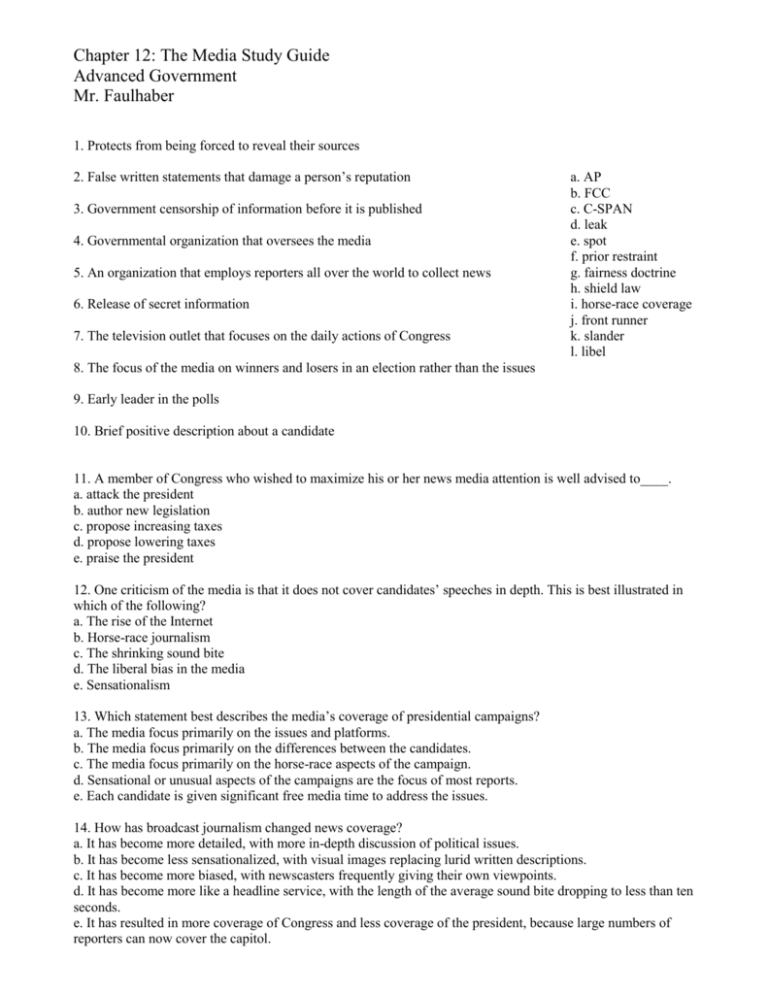
Chapter 12: The Media Study Guide Advanced Government Mr. Faulhaber 1. Protects from being forced to reveal their sources 2. False written statements that damage a person’s reputation 3. Government censorship of information before it is published 4. Governmental organization that oversees the media 5. An organization that employs reporters all over the world to collect news 6. Release of secret information 7. The television outlet that focuses on the daily actions of Congress a. AP b. FCC c. C-SPAN d. leak e. spot f. prior restraint g. fairness doctrine h. shield law i. horse-race coverage j. front runner k. slander l. libel 8. The focus of the media on winners and losers in an election rather than the issues 9. Early leader in the polls 10. Brief positive description about a candidate 11. A member of Congress who wished to maximize his or her news media attention is well advised to____. a. attack the president b. author new legislation c. propose increasing taxes d. propose lowering taxes e. praise the president 12. One criticism of the media is that it does not cover candidates’ speeches in depth. This is best illustrated in which of the following? a. The rise of the Internet b. Horse-race journalism c. The shrinking sound bite d. The liberal bias in the media e. Sensationalism 13. Which statement best describes the media’s coverage of presidential campaigns? a. The media focus primarily on the issues and platforms. b. The media focus primarily on the differences between the candidates. c. The media focus primarily on the horse-race aspects of the campaign. d. Sensational or unusual aspects of the campaigns are the focus of most reports. e. Each candidate is given significant free media time to address the issues. 14. How has broadcast journalism changed news coverage? a. It has become more detailed, with more in-depth discussion of political issues. b. It has become less sensationalized, with visual images replacing lurid written descriptions. c. It has become more biased, with newscasters frequently giving their own viewpoints. d. It has become more like a headline service, with the length of the average sound bite dropping to less than ten seconds. e. It has resulted in more coverage of Congress and less coverage of the president, because large numbers of reporters can now cover the capitol. 15. The Watergate story, as originally reported by Woodward and Bernstein, is an example of____. a. investigating journalism b. beat reporting c. a trial balloon d .yellow journalism e. broadcast journalism 16. How does regulation of radio and television broadcasts differ from the treatment of newspapers and magazines? a. Newspapers are not subject to libel and slander laws, while broadcasters are. b. The FCC regulates broadcasters but not newspapers. c. Because of the First Amendment, broadcasters and newspapers have equal free-speech rights. d. Newspapers do not need to be regulated because their content is rarely controversial; most papers simply report the news as it happens. e. Both newspapers and television stations must be licensed. 17. The television weekly 60 Minutes runs a segment on the role of local politicians in the drug trade. The issue soon becomes the subject of a national debate. In this role, 60 Minutes is acting as____. a. gatekeeper b. scorekeeper c. watchdog d. investigator e. muckraker 18. All of the following are current FCC guidelines for the media when conducting election coverage EXCEPT____. a. equal time doctrine b. right of reply rule c. political editorializing rule d. fairness doctrine e. both a and c 19. How does the American media differ from the media in most other countries? a. almost all American radio and television stations are privately owned b. the United States government has little power to regulate broadcasters c. the United States has very strict libel laws, and untruths about public officials usually result in fines d. most other countries have a Freedom of Information Act that permits the media to request information about the government e. because of federal grants and special funding, the media in the United States do not have to worry much about a profit 20. Broadcast journalism changed the media’s coverage of politics in all of the following ways EXCEPT____. a. a broadcast allows public officials to speak directly to audiences without their remarks bring filtered through editors b. politicians can reach voters on a national scale without the support of political parties c. people could easily ignore a speech by changing the channel d. citizens get more details and specific information about programs and policies than they could get from the print media e. public officials must do something bold or sufficiently colorful to gain free access to the broadcast media 21. When Gary Hart ran for the Democratic nomination in 1987, he told the press to go ahead and follow him, because ‘they would be bored.’ The resulting sexual scandal that arose is an example of the media’s role as____. a. a gatekeeper who influences what subjects become national political issues and for how long b. a scorekeeper who keeps track of and helps make political reputations c. a reporter who covers important facts in an unbiased manner d. a referee who carefully balances coverage of all the candidates e. a watchdog who closely scrutinizes candidates’ backgrounds and activities 22. Which of the following have to be proved in order for a public official to recover damages for libel? I. the statements were made with malice II. the statements are untrue III. the statements were made with a reckless disregard for the truth IV. the statement caused harm to the public official a. I and II b. I, II and III c. II and III d. III and IV e. I, II, III, and IV 23. The government can use all of the following tools to encourage positive stories and constrain negative stories written by journalists EXCEPT____. a. “spinning” a story by attacking a politician’s critics b. closing the “leaks” given to particular reporters c. revoking the licenses of stations that give unfavorable coverage d. using the press corps to release favorable stories e. refusing to give important background information 24. Why is there more news coverage of the president that of Congress or the courts? a. because the president is one person and is viewed be the public as the center of government b. because the president has the ability to call news conferences, whereas members of Congress must act through their leaders c. because the courts issue opinions that are difficult to understand, and it is difficult for the press to explain court decisions clearly d. because congressional committee hearings are usually closed to the press and the public e. the statement is inaccurate; Congress actually gets as must press coverage as the president does 25. The phenomenon of newspapers being financed by political parties and politicians developed____. a. in the early days of the republic b. during the Great Depression c. throughout most of the twentieth century d. only n recent years e. after the Civil War 26. Which of the following stories would most likely receive media coverage? a. a discussion of the detailed party platforms of each presidential candidate b. a story about a missing woman and her romantic relationship with a member of Congress c. a report about the safety recommendations made for all new SUVs d. a discussion of the leading economic indicators e. a study comparing birth defects in the United States with birth defects in Canada 27. The text argues that the U.S. Constitution contributed to the problem of press leaks when it____. a. established a Supreme Court b. created freedom of the press c. separated the branches of government d. established a national government e. established the executive branch and its appointed officers 28. The text suggests the extra-marital affairs of Franklin Roosevelt and John Kennedy were known to reporters, but not reported because____. a. there was not nearly so much media competition at the time b. libel laws were enforced more strictly at the time c. both men were Democrats d. reporters were not nearly so adversarial in their approach toward government at the time e. both a and d 29. Which of the following statements about negative ads is INCORRECT? a. they are associated with increased voter turnout b. they may change the preferences of some voters c. adversarial media coverage makes them more socially acceptable d. candidates use them because they work e. they are associated with reduced voter turnout 30. An important factor in the development of less partisan newspapers in the 19th century was the growth of____. a. Supreme Court rulings which involved charges of libel b. political patronage, which contributed needed funds to editors c. paid advertising, which reduced the needs for party subsidies d. government subsidies, which gave editors a strong financial base e. a large rural population, which balanced the urban bias of newspapers 31. The aspect of news reporting on which the political ideology of journalists is most likely to come into play is the issue of____. a. which stories to cover b. how to handle routine stories c. how long to carry a story d. how to present a story e. how much space to give a story 32. The new era of electronic journalism is best characterized by____. a. a diminishing interest in policy issues and the rise in overall popularity of major network programs b. emergence of news magazine programs on the major networks c. a diminishing importance of the three big networks and a rise in the popularity of cable entertainment-type programs d. an emphasis on talk shows and a diminishing importance of cable television e. greater interest in public confrontations on policy issues by major network journalists and less interest in human interest stories 33. Compared to the average citizen, members of the national media are____. a. somewhat more liberal b. more moderate c. somewhat more conservative d. far more conservative e. far more liberal 34. Compared to the way the public views the credibility of the media, the media sees themselves as____. a. powerless but popular b. more powerful but less reliable c. fair and unbiased d. more biased but also more popular e. less powerful but more reliable 35. Since the 1970’s, how has the relationship between the press and the media changed? a. it has become friendlier because presidents are now more willing to answer questions b. it has become more adversarial, partly as a result of the Vietnam War and Watergate c. it has become more adversarial because embarrassing stories sell more newspapers d. it has not changed, because we have always had a free press e. it has become less critical of the president because surveys show that people do not like the cynicism of the media 36. On which of the following issues are the media most likely to have the greatest influence on the national political agenda? a. an issues such as unemployment that affects people personally b. an issue such as school taxes that affects people at the local level c. an issue such as abortion or school prayer with which the courts have been involved d. an issue such as the environment with which people have little personal experience e. both a and c 37. Media affect politics in all of the following ways EXCEPT______. a. making people aware of issues b. affecting people’s attitudes toward government c. influencing how election campaigns are conducted d. increasing the quality of legislative programs e. increasing the costs of running for office 38. The impact of television on “political unknowns” has been to____. a. doom their campaigns by pointing out their obscurity b. enable some to become serious candidates quickly c. give them an instant advantage over the incumbents d. allow them to dominate the political arena e. make them more reliant on their respective party 39. The existence of national media, including newsweeklies, is important to politicians because____. a. the news they report is more succinct and easy to digest b. the national media tends to be more liberal than the local media c. the national media tends to be more conservative than the local media d. the national media tends to be more representative of the political philosophy of Americans than the local media e. federal officials are more likely to follow the national media 40. According to Peter Braestrup, in reporting the 1968 Tet Offensive, the media____. a. over-exaggerated the violence associated with the military’s actions b. paid little attention to what turned out to be the most important story of the Vietnam War c. downplayed evidence of communist success d. portrayed a North Vietnamese military defeat as a success e. acquitted themselves well 41. In presidential elections throughout this century, most local newspapers have____. a. favored the Democratic in all but one instance. b. split about evenly between parties. c. favored the Democrat slightly more often than the Republican. d. favored Independents, with the exception of Ronald Reagan. e. favored the Republican in all but one instance. 42. The relationship between public officials and the media can best be described as one of____. a. benevolence b. love-hate c. antagonism d. dependency e. rivalry 43. The federal government sued the New York Times to prevent it from publishing ____. a. the Pentagon Papers b. reports of Reagan’s arms-for-hostages dealings c. secret grand jury findings on the Watergate scandal d. video tape of G. Gordon Liddy orchestrating a break-in e. accounts of Japanese-Americans detained in the United States concentration camps during World War II 44. According to the text, why is a candidate for the Senate more likely to advertise on television than a candidate for the House? a. because a senator’s constituency might include a sizeable proportion of voters who do not watch television b. because a senator’s salary is three times that of a member of the House who can rarely afford such advertising c. because a senator’s constituency is more widely concentrated geographically d. because a senator’s constituency is more narrowly concentrated geographically e. because senators typically choose media that provide a more direct way of reaching voters 45. One explanation for the adversarial relationship that has developed between government officials and the media since Watergate is____. a. the growing power of local media b. the use of canned news c. the use of news releases d. the pressure on the media to retain their sources of information e. competition within the media for news honors and awards 46. An innovative news establishment set up in 1848 to provide systematic dissemination of news to publications of different political persuasions was the____. a. Associated Press b. ticker tape c. Rider’s Club d. Pony Express e. Washington Globe The Media Essay Question 1. One of the most important ways the news media influence politics is through agenda setting. a. Define policy agenda b. Explain how the national news media engage in agenda setting. c. Explain the primary reason the president tends to have an advantage over Congress in gaining media attention.
